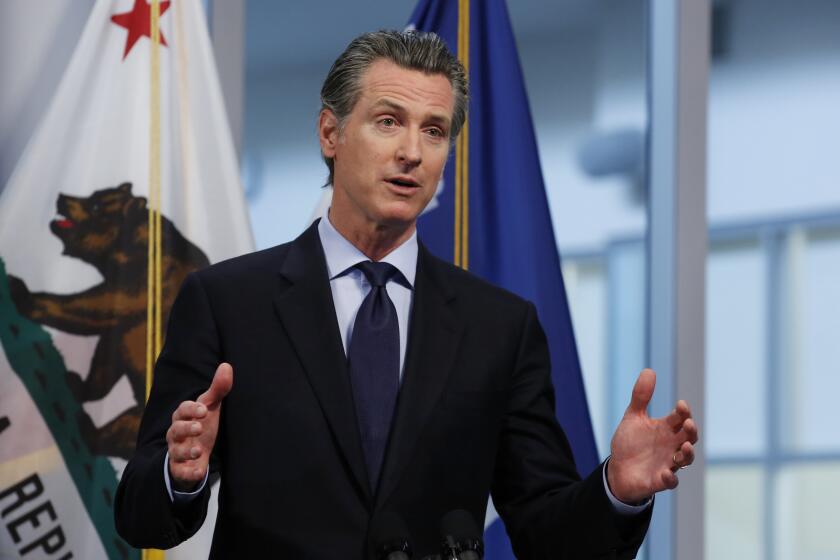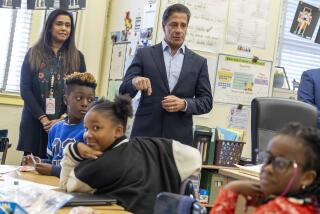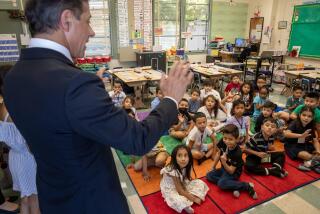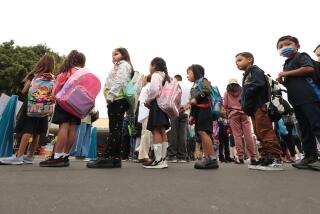No L.A. Unified student will get an ‘F’ on spring report card

No students will receive failing grades on their spring report cards, Los Angeles school officials announced Monday, taking an assertive step on student assessment decisions confronting school systems across California.
The bold move is the latest decision to reshape education in response to the coronavirus pandemic that has shuttered California schools and forced distance learning for about 6.2 million students. Actions have included canceling “mandatory” standardized tests, relaxing college admission requirements and turning Advanced Placement tests into take-home exams.
Concern over the ability of all students to access and benefit from online coursework tipped the scales for the L.A. Unified School District’s no-fail decision. In a concurrent move, officials said that a student’s grade will be no worse than what it was on March 13, the final day of campus-based instruction. But it could improve: Teachers are expected to devise reasonable opportunities for students to improve their grades.
“Many of the examples we see of successful video learning have a significant selection bias,” said L.A. schools Supt. Austin Beutner. “Affluent families with resources at home, schools with years of training and limitless budgets and students with demonstrated aptitude to learn independently. Public schools have in their DNA the commitment to serve all students, irrespective of circumstance, and it will not be so simple.”
With its Monday announcement, L.A. Unified moved out in front of many school systems still grappling with grading.
Long Beach Unified on Monday said the district was not yet ready to announce what it would do. Parents and principals in Santa Monica have provided mixed feedback to officials there. Palos Verdes Peninsula Unified will stick with a traditional grading system for now, but the matter remains under review, said Supt. Alex Cherniss.
Coronavirus has upended college decisions for high school seniors as they grapple with affordability, safety and family obligations
Other districts are moving forward in different ways. In South Pasadena, high school students must choose either a letter grade or Credit/No Credit format by May 29.
At Fresno Unified, where about 87% of students are members of low-income families, officials have adopted a plan that shares common features with L.A. Unified’s. Fresno uses the quarter system, and the third-quarter grade will be extended into the fourth quarter. But students must be provided with opportunities to raise their grade — based on content that was taught in class prior to campus closures. However, it still will be possible for students to fail a class if they already had a failing grade.
The lowest grade will be a “D” in L.A. Unified, and avoiding a “D” should be motivation enough for students to apply themselves, said Chief of Schools David Baca, who provides support to the district’s regional clusters of schools.
In L.A., officials said they decided to err on the side of compassion and equity — balancing academic rigor and the need to motivate students against the sobering knowledge that family hardships would inevitably compromise the ability of thousands of students to learn, especially in a school system where 80% of students are members of low-income households.
The no-fail policy was widely, but not universally, applauded.
“Students shouldn’t be expected to give their 100% during this time,” said Frances Suavillo, a Carson High senior who represents students as a non-voting member of the Board of Education. “This situation is beyond our control and it’s relieving to know that we won’t get penalized for it.”
But a high school principal said he’s worried about what will happen with students who are not intrinsically motivated to push forward academically, especially under challenging circumstances.
“This policy makes it feel like school ended on March 13,” said the principal, who asked not to be named because he was not authorized to speak. He worried that students would abandon valuable academic work that also was giving them reason to remain safe at home.
Gov. Gavin Newsom lays out the next steps in the weeks and months ahead in California’s fight against the coronavirus.
Some teachers also expressed reservations.
“I don’t see how a student who was failing and now doesn’t respond to any online learning assignments would ever deserve class credits,” said Stephen Cordova, an English teacher at Dorsey High in the Crenshaw/Baldwin Hills area.
The teachers’ union, United Teachers Los Angeles, supports the district’s position.
“Students who weren’t doing well March 13, when this unprecedented crisis began, still had three months of school where they could have accessed in-person intervention to improve their grade,” said union President-Elect Cecily Myart-Cruz. “That is no longer available. Students improve, often dramatically.”
L.A. Unified’s decision on grading quickly reverberated beyond the district’s borders.
Gary Grayson, a teacher in the Conejo Valley Unified School District, said that in his 11th grade U.S. History class, individual student patterns simply replicated themselves in the new setting. Previously diligent students remain so, while students who “rarely” turn in work are not doing so now.
But even when everyone is doing their part, the situation for students and families can be difficult.
A month after campuses closed, Elizabeth Chavez said their family still does not have a broadband connection at home for her daughter Alondra, a second-grader at Stoner Avenue Elementary in Del Rey. She called a local provider offering free service, but installers might not be available for weeks.
Beutner used his emergency powers to authorize $100 million in spending on technology — both computers and broadband hot spots — but the hot spots had yet to reach all schools before spring break.
The challenges to keeping up academically vary from student to student.
Julissa Alvarado, a 9th-grader at Venice High School, said last week that she is trying to maintain a focus on her studies, but she finds the distance learning “boring.” Her parents don’t speak English, making it harder for them to help her navigate schoolwork, and the crisis has increased the family’s economic stress, resulting in reduced work hours for her father, a gardener, and her mother, a housekeeper.
Last week at the Mar Vista Family Center, she was the oldest among a group of six standing in line for free meals provided by L.A. Unified. She carried her 1-year-old sister, Allison, and supervised her cousins, some still in pajamas, who ranged in age up to 11.
The people who are adapting best to working from home are the ones who have been juggling demands all along: parents.
In his video address from his home Monday, Beutner acknowledged that worries about failing a class should not add to the pressure that so many students are dealing with.
“It was made very real for me late one evening last week,” he added, “when I received a message from a student having suicidal thoughts because of the pressure she was feeling about school and all the chaos around her,” he said. “The fast actions of a team from Los Angeles Unified got her to a hospital where she’s receiving care.”
But her hardship indicated how many students and families are in need of help, he said.
Even before the recent economic meltdown, the district had estimated that 17,000 students are part of homeless families. In all, the district serves about 482,000 students from kindergarten through 12th grade.
In his remarks, Beutner also confirmed what many had anticipated: L.A. campuses would remain closed for the remainder of the school year. He added that closures would continue through the summer, but summer school offerings would be expanded even as students continued learning from home.
Sonali Kohli contributed to this report.
Coronavirus might have been in California as early as December. The timing had dire consequences
More to Read
Start your day right
Sign up for Essential California for news, features and recommendations from the L.A. Times and beyond in your inbox six days a week.
You may occasionally receive promotional content from the Los Angeles Times.










